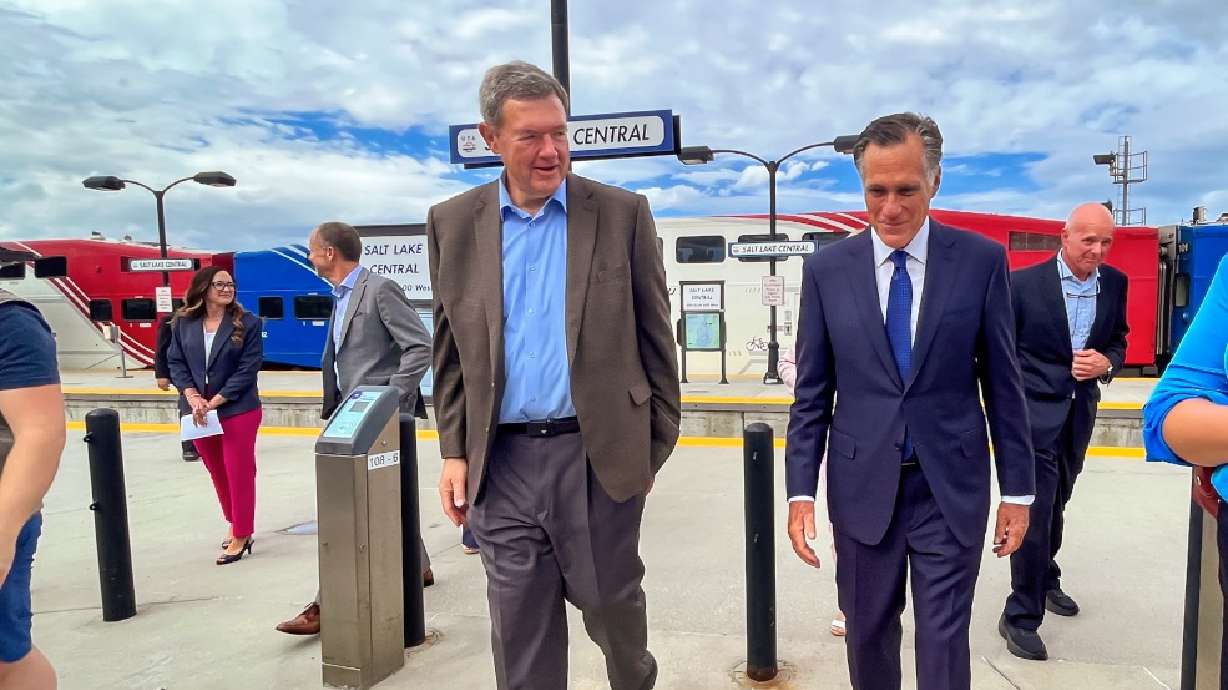Estimated read time: 3-4 minutes
This archived news story is available only for your personal, non-commercial use. Information in the story may be outdated or superseded by additional information. Reading or replaying the story in its archived form does not constitute a republication of the story.
SALT LAKE CITY — Sen. Mitt Romney says Utah is already benefiting from the "hundreds of millions of dollars" to help upgrade the state's aging transportation system from the Bipartisan Infrastructure Law; however, he contends the federal government has been slow to provide the funds necessary to complete projects that would greatly improve transit service.
That includes Utah Transit Authority's massive $966 million project to double the amount of double-tracking available along its FrontRunner commuter train line. Romney calls the project "critical for the success of that system," allowing for 15-minute frequency during peak times and Sunday service — both impossible at the moment because of the length of line that is single-tracked.
The Biden Administration's proposed 2024 transportation budget includes nearly $317 million toward the project, but Romney says the current way of allocating money for projects is holding the project back. The project is currently expected to be completed by 2029.
"The federal government has been sort of slow-walking it," he said Monday, as he stood near the entrance at Salt Lake Central Station. "We want to show them that they ought to be looking at our growth as opposed to just looking at our current ridership. If they do that, we'll be able to get the funds, and this is going to be on our shoulders."
Romney met with representatives of the Utah Transit Authority and the Utah Department of Transportation Monday morning, learning more about the agencies' plans to improve public transit operations throughout the growing state. It was the first stop on his short tour around Salt Lake County over the next few days.
The federal government allocated close to $1.3 billion for road, bridge, public transit, port and airport projects from the Bipartisan Infrastructure Law, a bill that the senator helped craft. It's also eligible to receive more federal funding for projects like double-tracking FrontRunner.
UTA executives touted the double-tracking project earlier this year as they celebrated the 15th anniversary of the commuter line's service. They view it as a foundational piece of what they call "FrontRunner 2.0," explaining in April that they were working with UDOT to analyze the "potential locations of these double track segments" to increase service options.
Related:
The project is important for the future of Utah transportation, making it easier for people to opt for the train over roadways because of its 15- to 30-minute service over its current 30- to 60-minute service, said UDOT Executive Director Carlos Braceras, who helps oversee UTA's capital development.
Braceras said the state has already set aside almost $400 million toward it, along with $75 million set up to purchase low- to no-emission engines, as a part of the large overhaul. He also believes Utah's investment in the project, so far, on top of help from its congressional delegation and the project's benefits will make a strong candidate to receive federal funding as early as the 2024 fiscal year.
"I am very optimistic that Utah will get the money," he told KSL.com, adding that it may just be a matter of how much Utah actually receives from the federal government. "When Washington makes an investment, they want to make sure that projects get done, that they're built within budget and on schedule. Utah has a history of doing that."
The proposed budget also includes nearly $55 million for the Midvalley Connector, a UTA bus rapid transit project in Salt Lake County.
The current timeline for projects would still put it on pace to be ready for the 2030 or 2034 Winter Olympics, which both Romney and Braceras said would be a huge boost to Salt Lake City's bid in addition to their benefits to the growing Wasatch Front. They say the more that's invested in transit now will help future traffic congestion woes that are projected in the coming decades as more people live in the region.
"We're growing so fast, we can't just build roads," Braceras said. "We need to build transit and we need to build more active transportation."











